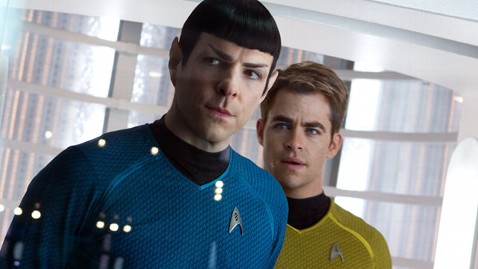Movie Review: 'Star Trek Into Darkness' Doesn't Feel Like 'Star Trek'

Paramount Pictures/AP Photo
J.J. Abrams is a genius, and it's not because "Star Trek Into Darkness" is a great movie. It is not.
Director Abrams and his team are clearly passionate about the original "Star Trek" and the early "Star Trek" movies. His 2009 big-screen reboot was simply fantastic, and while he's said that film was directed at "Star Trek" fans, "Star Trek Into Darkness," he says, was made with the general movie-going public in mind, which sounds like code for, "We dumbed it down."
Somewhere in the back of Abrams's mind, he must feel like James T. Kirk when he beat the Kobayashi Maru. For those who don't know, in "Star Trek" mythology the Kobayashi Maru is an unbeatable test given to Starfleet cadets to judge how they handle themselves in a no-win situation. Kirk is the only cadet who's ever beaten it, and that's because he cheated. With their intention of making a "Star Trek" movie more appealing to the mainstream, Abrams and his team of writers were creating their own no-win situation with die-hard "Star Trek" fans and, you would think, discerning moviegoers. The question is, did he get away with it? Well, yes - but only because he cheated.
From the opening scene of "Star Trek Into Darkness," Abrams treats us to an absolutely stunning, IMAX 3D experience. Visually, it's one of the best uses of this technology thus far.
On a distant planet, Captain Kirk (Chris Pine) and Dr. Leonard "Bones" McCoy (Karl Urban) are running through a lush, vivid red field that's so pleasing to look at, you may experience multiple eyegasms. Chasing them are the planet's primitive denizens, who have no idea that they're not alone in the universe. Turns out, Kirk and friends are trying to save the planet by dropping Spock (Zachary Quinto) into a volcano, where he'll deposit a device that will kill the volcano and save the planet. Only something goes wrong and puts Spock in danger. In order to save him, Kirk will have to reveal the Enterprise to the natives, in violation of Starfleet's Prime Directive, which is to never interfere with a developing culture.
Guess who's willing to die rather than break the Prime Directive? Spock! Guess who's going to break rules to save his friend? James T. Kirk! Back on Earth, Kirk's violation gets him stripped of his command of the Enterprise, and the captain's chair is returned to Kirk's mentor, Captain Pike.
In the meantime, this dude John Harrison - played by Jeremy Irons' younger and better-looking clone, Benedict Cumberbatch - has convinced a Starfleet member to suicide-bomb an important Starfleet building. That act of terrorism forces the highest-ranking members of Starfleet to gather in a completely unsecure room high above Starfleet headquarters, a room that's curiously susceptible to outside attack. Which Harrison provides, ultimately resulting in Kirk getting the Enterprise back, with the mission of going after Harrison.
Cumberbatch's character has been the subject of much debate. Is he Khan, the genetic superman from the original series? Sorry to disappoint you, fans: he's actually Guinan, the bartender played by Whoopi Goldberg in "Star Trek: The Next Generation.: Ok, fine, he's Khan. It's out there. It's on IMDB. I'm not telling you anything most people who care don't already know.
Most "Star Trek" fans will be thrilled when Harrison reveals his real name, and they'll be thrilled to hear and see the many other references to the original "Star Trek" series. It's familiar territory, and that's one of the reasons we so readily consume properties that have already been done, and done successfully. And this is the cheating I mentioned earlier. By serving "Star Trek" fans familiar series touchstones set against an extraordinary visual palate that was unimaginable even 10 years ago, Abrams will win over less discerning fans. It's an extraordinary illusion, executed with cunning direction and mostly excellent acting.
It is easy to see why Cumberbatch has developed a dedicated following from his work as the title character on the British series "Sherlock." He's a walking spectacle. If I was an actor with an ego, I would not want to share screen time with this man. Unless you're there to be comic relief, Cumberbatch is going to make you look like a dinner theater actor . Which brings me to Pine, who really is an excellent actor. However, while his angst and rebellious attitude was perfect for Kirk in the 2009 reboot, it doesn't work here. When he gets angry, he sounds like a bratty child, similar to Luke Skywalker in "Star Wars" before he took his hero's journey. In this movie, Pine has a moment when Kirk makes a decision that harkens back to "Star Trek: The Wrath of Kahn." It seems so forced and nonsensical, watching House Speaker John Boehner hold hands with Sen. Al Franken and sing campfire songs would seem less forced and more, well, logical.
As Abrams said, "Star Trek Into Darkness" was designed to appeal to a mass audience. From my perspective, that was a huge mistake. Whether you're a serious "Star Trek" fan or merely a discerning movie fan, you're likely going to find yourself annoyed by this sell-out philosophy and how it affects the film. At the same time, Spock, Bones and Scotty (Simon Pegg) will make you laugh, and the visuals will impress. In the case of James T. Kirk and J.J. Abrams, cheaters do indeed win. At least, they do at the box office.
Two-and-a-half out of five stars.